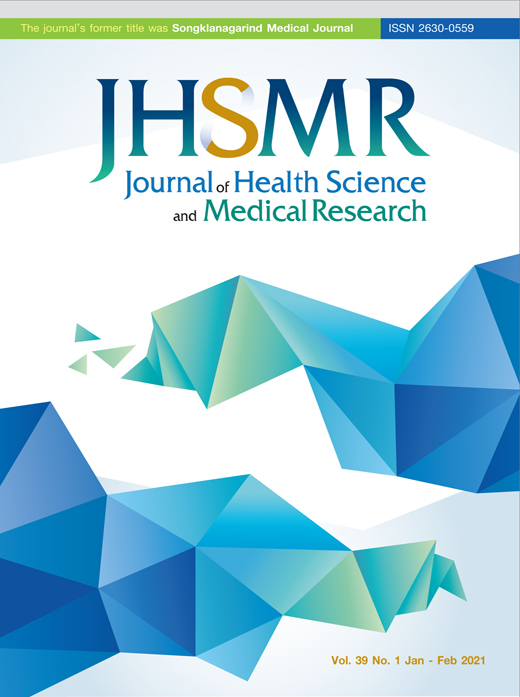Strategies to Cope with Moral Distress among Mental Health Nurses in Thailand
DOI:
https://doi.org/10.31584/jhsmr.2020762Keywords:
coping, distress, mental health, moral, nursesAbstract
Objective: The purpose of this study was to explore the strategies used by Thai mental health nurses to cope with the moral distress that often results from their work.
Material and Methods: The study was performed using a qualitative, narrative method. Participants were recruited into the study using a purposive snowball method. A total of 41 mental health nurses met the inclusion criteria and were in-depth interviewed about their strategies to cope with moral distress, with content analysis being used to analyze the data.
Results: Six principal themes were found, classified as (1) releasing tension by talking to others, (2) positive self-talk, (3) believing in my ability to handle problems, (4) using my training and experience of nursing to self-help, (5) being with professional autonomy, and (6) participating in a case conference group. These strategies were used by the Thai mental health nurses in the study to cope with the moral distress resulting from their work.
Conclusion: Awareness of these strategies to cope with the moral distress related to work can benefit mental health nurse leaders, including head nurse and head ward nurses to provide suitable nursing staff development to enhance the quality of the psychiatric nursing practice.
References
Sadock BJ, Sadock AV. Comprehensive textbook of psychiatry. Philadelphia: Lippincott, Williams and Wilkins; 2017.
Moe C, Kvig EI, Brinchmann B, Brinchmann Bs. “Working behind the scenes”. An ethical view of mental health nursing and first–episode psychosis. Nurs Ethics 2013;20:517-27.
Weimand BM, Sallstrom C, Hall-Lord ML, Hedelin B. Nurses’ dilemmas concerning support of relatives in mental health care. Nurs Ethics 2013;20:285-98.
Choe K, Song EJ, Jung CH. Ethical problems experienced by psychiatric nurses in Korea. Arch Psychiatr Nurs 2012; 26:495-502.
Eren N. Nurses’ attitudes toward ethical issues in psychiatric inpatient settings. Nurs Ethics 2013. doi: 10.1177/ 0969733013500161.
Mekechuk J. Moral distress in the pediatric intensive care unit: the impact on pediatric nurses. Int J Health Care Qual Assur Inc Leadersh Health Serv 2006;19:i-vi.
Gutierrez K. Critical care nurses’ perceptions of and responses to moral distress. Dimens Crit Care Nurs 2005;24: 229-41.
Nathaniel A. Moral reckoning in nursing. West J Nurs Res 2006;28:419-38.
Shaher H. Moral distress and its correlates among mental health nurses in Jordan. Int J Ment Health Nurs 2014;23:33-41.
Jansen TL, Hanssen I. Patient participation: causing moral distress in psychiatric nursing?. Scand J Caring Sci 2016;388: 94.
Delfrate F, Ferrara P, Spotti D, Terzoni S, Lamiani G, Canciani E, et al. Moral distress (MD) and burnout in mental health nurses: a multicenter survey. Med Lav 2018;109:97-109.
Powell SB, Engelke KM, Swanson MS. Moral distress among school nurses. J Sch Nurs 2018;34:390-7.
Musto L, Shreiber RS. Doing the best I can do: moral distress in adolescent mental health nursing. Issues Ment Health Nurs 2012;33:137-44.
Austin W, Rankel M, Kagan, L, Bergum V, Lemermeyer G. To stay or to go, to speak or stay silent, to act or not to act: moral distress as experienced by psychologists. Ethics Behav 2005;15:197-212.
Deady RM, McCarthy J. A study of the situation, features, and coping mechanisms experienced by Irish psychiatric nurses. Perspect Psychiatr Care 2010;46:209-20.
Kirkpatrick H. A narrative framework for understanding experiences of people with severe mental illness. Arch Psychiatr Nurs 2008;22:61-8.
Hall LM, Kiesners D. A narrative approach to understanding the nursing work environment in Canada. Soc Sci Med 2005;61:2482-91.
Austin W, Bergum V, Goldberg L. Unable to answer the call of our patients: mental health nurses’ experience of moral distress. Nurs Inq 2003;10:177-83.
Corley MC. Nurse moral distress: a proposed theory and research agenda. Am J Crit Care 1995;4:280-5.
Bell J, Breslin JM. Healthcare provider moral distress as a leadership challenge. JONAS Health Law Ethics Regul 2008;10:94-7.
Hanrahan N. Psychiatric nurse staffing in hospitals: is it adequate?. J Am Psychiatr Nurses Assoc 2012;18:27-9.
Riessman CK. Narrative methods for the human sciences. London: SAGE; 2008.
Maluwa VM, Andre J, Ndebele P, Chilemba E. Moral distress in nursing practice in Malawi. Nurs Ethics 2012;19:196-207.
Kertchok R. Ethical issues and moral distress in psychiatric and mental health nursing: a literature review. J Health Res 2015;29:227-34.
Lazarus RS, Folkman S. Coping and adaptations. In: Gentry WD, editors. Handbook of behavioral medicine. New York: The Guildford Press; 1984:p.282–325.
Lievrouw A, Vanheule S, Deveugele M, De Vos M, Pattyn P, Belle V. et al. Coping with moral distress in oncology practice: nurse and physician strategies. Oncol Nurs Forum 2016;43: 505-12.
Sarkoohijiabalbarezi Z, Ghodovsi A, Davaridolatabadi E. The relationship between professional autonomy and moral distress among nurses working in children's units and pediatric intensive care wards. Int J Nurs Sci 2017;4:117-21.
Downloads
Published
How to Cite
Issue
Section
License

This work is licensed under a Creative Commons Attribution-NonCommercial-NoDerivatives 4.0 International License.
























